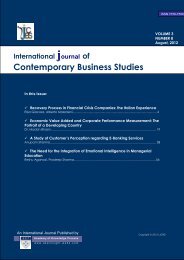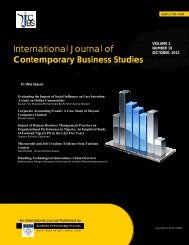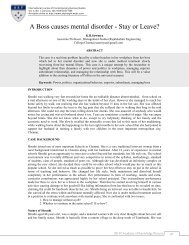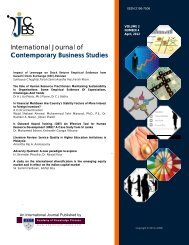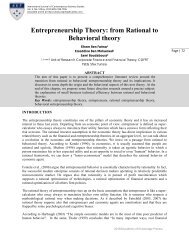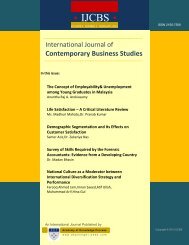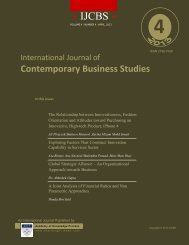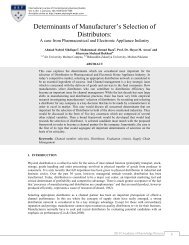Contemporary Business Studies - Academy of Knowledge Process ...
Contemporary Business Studies - Academy of Knowledge Process ...
Contemporary Business Studies - Academy of Knowledge Process ...
You also want an ePaper? Increase the reach of your titles
YUMPU automatically turns print PDFs into web optimized ePapers that Google loves.
International Journal <strong>of</strong> <strong>Contemporary</strong> <strong>Business</strong> <strong>Studies</strong><br />
Vol: 3, No: 1. January, 2012 ISSN 2156-7506<br />
Available online at http://www.akpinsight.webs.com<br />
An Evaluation <strong>of</strong> Network Risks in<br />
Supply Chains<br />
Dr. Archie Lockamy III<br />
Margaret Gage Bush Pr<strong>of</strong>essor <strong>of</strong> <strong>Business</strong><br />
Pr<strong>of</strong>essor <strong>of</strong> Operations Management<br />
Brock School <strong>of</strong> <strong>Business</strong><br />
Samford University<br />
Birmingham,<br />
Alabama, USA<br />
ABSTRACT<br />
The purpose <strong>of</strong> this article is to introduce a methodology for evaluating network risks in<br />
supply chains. The methodology is proposed as an analytical tool which can be used to<br />
assist managers in the examination <strong>of</strong> network risk levels associated with their supply<br />
base. Empirical data from a major US automotive company is analyzed using Bayesian<br />
networks. The networks provide a methodological approach for determining a supplier’s<br />
external, operational and network risk probability, and the potential revenue impact a<br />
supplier can have on the company. The research findings are that Bayesian networks can<br />
be used to develop supplier risk pr<strong>of</strong>iles to determine the risk exposure <strong>of</strong> a company’s<br />
revenue stream. The supplier risk pr<strong>of</strong>iles can be used to determine those risk events<br />
which have the largest potential impact on an organization’s revenues, and the highest<br />
probability <strong>of</strong> occurrence. The methodology used in this research study can be adopted by<br />
managers to formulate supply chain risk management strategies and tactics which<br />
mitigate overall supply chain risks. Thus, as part <strong>of</strong> a comprehensive supplier risk<br />
management program, organizations along with their suppliers can use this methodology<br />
to develop targeted approaches to minimize the occurrence <strong>of</strong> supply chain risk events.<br />
Keywords: Supply Chains; Supply Networks; Supply Chain Risks; Risk Events;<br />
Supplier Risk Pr<strong>of</strong>iles; Bayesian Networks.<br />
1. INTRODUCTION<br />
Due to the effects <strong>of</strong> lessening product lifecycles, demanding customers and employees, decreasing<br />
acceptable response times, and increasing levels <strong>of</strong> global competition on business success, many<br />
organizations have formulated extended enterprises known as supply chains. These entities can be<br />
described as organizational networks designed to help firms achieve a competitive advantage via<br />
improved market responsiveness and cost reductions. According to Sawhney et al (2006), supply chains<br />
can also provide organizations with a means for promoting business innovation through the adoption <strong>of</strong><br />
streamlined information flows, restructured business processes, and enhanced collaboration between<br />
network members.<br />
A result <strong>of</strong> an organization’s increased reliance on supply chain networks is its augmented susceptibility<br />
to the network risk pr<strong>of</strong>iles <strong>of</strong> its suppliers, as well as other risk categories associated with the supply<br />
6<br />
Copyright © 2012. <strong>Academy</strong> <strong>of</strong> <strong>Knowledge</strong> <strong>Process</strong>



